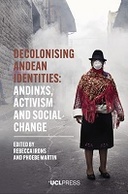Explore

Decolonising Andean Identities
0 Ungluers have
Faved this Work
Login to Fave
Decolonising Andean Identities presents ground-breaking work from scholars carrying out social science research in and from Andean Latin America. It addresses themes of central importance to contemporary perspectives on interdisciplinary gender studies and politics in societies undergoing significant social transformation.
The collection aims to develop the field of decolonial gender studies by showcasing interdisciplinary work at the forefront of scholarship. It draws on international expertise through its diverse contributors, including predominately Latin American scholars. There is an urgent need to broaden the perspectives on gender and gender-based activism in Latin America beyond the Southern Cone and Mexico in order to bring the region as a whole into dialogue with global scholarship.
The contributors use the term ‘Andinxs’ as a provocation to encourage scholars of the region to reconsider approaches the politics of gender, sexuality and (de)coloniality. By responding to the question, ‘Who are Andinxs (Andin-exs)?’ the collection interrogates the postcolonial, gendered and political subjectivities currently undergoing dramatic social change in Andean Latin America.
Praise for Decolonising Andean Identities
'Decolonizing Andean Identities is a brilliant contribution to the scholarship of the Andean region that offers readers a new grammar for thinking about gender and feminist activism in a decolonial register. Irons and Martin introduce the term ‘Andinx’ as a critical reevaluation of ‘andeanism,’ pushing the boundaries of academic discourse to encompass the rich, multifaceted experiences of those living in the Andes today.'
Julieta Chaparro-Buitrago, University of Cambridge
'This is a timely and inspirational collection that captures the power and potential of intersectional feminist activism in the Andes. Breaking new ground conceptually through the term Andinx, it also provides fascinating decolonial insights into gender, sexualities, indigeneity and feminism.'
Cathy McIlwaine, King’s College London
This book is included in DOAB.
Why read this book? Have your say.
You must be logged in to comment.
